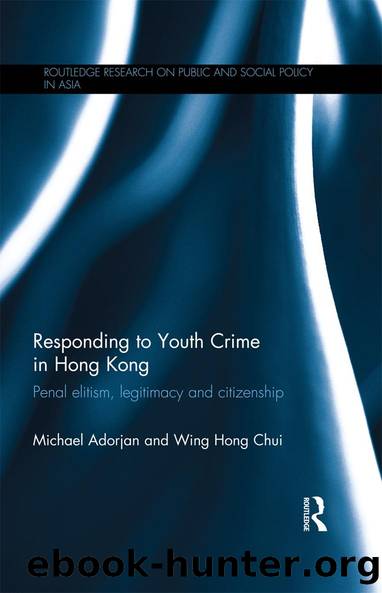Responding to Youth Crime in Hong Kong by Michael Adorjan Wing Hong Chui

Author:Michael Adorjan, Wing Hong Chui [Michael Adorjan, Wing Hong Chui]
Language: eng
Format: epub
ISBN: 9781138069244
Barnesnoble:
Publisher: Taylor & Francis
Published: 2017-05-03T00:00:00+00:00
Discussion
That the MACR was finally raised from seven to ten in 2003 may have appeared to observers at the time of the progressive politics instilled in the period before the handover, and the efficacy of non-governmental organizations aiming to raise public awareness of young personsâ social welfare rights and needs. A new discourse of internationalism and appeals to conventions on human rights, especially related to responding to crimes by children and youth, pervaded the debates over raising the MACR immediately after the handover. There also seemed to be a new era of widespread consultation occurring, with the potential for the post-handover government to implement legal changes based on public and organizational input. Cipriani (2009: 113) describes Hong Kongâs process in 1999 as âexceptional[ly] detailed, soliciting public opinion and academic commentâ before finally reforming the legislation in 2003. Such consultation is no doubt motivated by Hong Kongâs ratification of the UNCRC. The Committee on the Rights of the Child (CRC), the international organization that monitors how nations implement the UNCRC, noted in 2004 the âcommendable high levelâ of nations with minimum ages between 14 and 16. The CRC has subsequently remonstrated nations that retain ten or below as their MACR, which they deem âinsufficientâ (Cipriani 2009: 58).
Clearly these international pressures played a role. As the post-1997 SAR government was a new regime largely lacking popular support, it was behooved to gain legitimacy through ânormative and performance elementsâ (Alagappa 1995b: 31; see Chapter 2). It did so in part with an acute concern to present its regime as one aligning with international conventions on human rights. Alagappa notes that along with charismatic presence, authority can be claimed from politically defined moments as well as international support (Alagappa 1995b: 31). The consultation exercises engaged in the late 1990s by the LRC and the changes to the MACR laws soon after the handover seemed clearly geared to serve such political ends, and could well have signaled a sea change regarding governmental public consultation and political participation in Hong Kong.
It would, however, be too instrumentalist to argue that the timing of the final passing of the juvenile justice amendments in 2003 was purely motivated by wider political considerations such as the post-colonial governmentâs need to maintain legitimacy. Clearly the stakeholders involved, from those who participated in the wide consultation process initiated by the LRC, to the LegCo and Bills Committee members who advocated for protection of children in conflict with the law and their need for programs and services, all felt genuine concern for the situation of child offenders both above and below the MACR. Rather, it may be argued that the discourses of innocence that were unilaterally employed to depict child offenders below the MACR were resources the government drew upon that, when combined with discourses of internationalism and human rights, provided an alignment of political and social welfare goals. Moreover, in many respects officials were bound to a largely sedimented system of disciplinary welfare in place for juvenile offenders where rehabilitation and treatment are closely braided with disciplinary correctional response (see Chapter 3).
Download
This site does not store any files on its server. We only index and link to content provided by other sites. Please contact the content providers to delete copyright contents if any and email us, we'll remove relevant links or contents immediately.
| Africa | Americas |
| Arctic & Antarctica | Asia |
| Australia & Oceania | Europe |
| Middle East | Russia |
| United States | World |
| Ancient Civilizations | Military |
| Historical Study & Educational Resources |
Machine Learning at Scale with H2O by Gregory Keys | David Whiting(4313)
Never by Ken Follett(3955)
Fairy Tale by Stephen King(3396)
Oathbringer (The Stormlight Archive, Book 3) by Brandon Sanderson(3214)
The Man Who Died Twice by Richard Osman(3077)
Will by Will Smith(2919)
Rationality by Steven Pinker(2363)
Can't Hurt Me: Master Your Mind and Defy the Odds - Clean Edition by David Goggins(2339)
The Dark Hours by Michael Connelly(2307)
Friends, Lovers, and the Big Terrible Thing by Matthew Perry(2230)
The Dawn of Everything: A New History of Humanity by David Graeber & David Wengrow(2208)
Principles for Dealing With the Changing World Order: Why Nations Succeed and Fail by Ray Dalio(2054)
A Short History of War by Jeremy Black(1848)
HBR's 10 Must Reads 2022 by Harvard Business Review(1843)
Go Tell the Bees That I Am Gone by Diana Gabaldon(1757)
A Game of Thrones (The Illustrated Edition) by George R. R. Martin(1744)
Kingdom of Ash by Maas Sarah J(1677)
515945210 by Unknown(1666)
443319537 by Unknown(1557)
